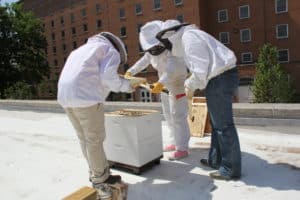Every beekeeper is a citizen scientist.
Have you noticed how in a beekeeping meeting everyone is sharing tips, experience, and advice? We are all comparing our practices, our successes, our failures. We want to hear about other people mistakes (and learn from them). We want to try their recommendations for ourselves.
When taking my beekeeping class, the most repetitive advice that our mentors provided us was to keep detailed records. Not only is it a requirement under Belgium’s legislation for hygiene of food products (yes, we do have legislation for everything in Belgium, that’s one of our oldest traditions, along with beer) but the advantages of keeping records clearly outnumber the effort. Should you start, you will soon be rewarded in terms of efficiency and personal pride (beekeepers are always proud to share stories about their bees). Keeping notes on your hives and your practices will take you a little time and organization but it will make you a better beekeeper than you already are.
(Commercial beekeepers have their own way of keeping track of their apiaries and this post will not cover their special needs.)
Why should you bother taking notes? (if you’re convinced already, watch out for my next blog to see “How”)
There is already too much going on at the same time when you are in your apiary! You want to limit the time the hive is open: hive tool in one hand, a frame in the other, one eye on your smoker, the other on the queen; how are you going to take notes? But here is the secret, with a well-kept record of your previous visits at hand, knowing precisely what to look for, what actions are needed, and what objectives you have, your visit will be even shorter and more effective.
One of my mentors used to say that every visit of a hive is like a heart surgery: you are opening the body of the hive, displacing vital organs, shining light on things that would much rather stay alone in the dark… You don’t want your visit to take more time than it needs and you don’t want to do it more often than is needed. Every time you open a hive, you disrupt your bee’s workday. They have to clean after you, re-propolize every split, rearrange their space… and in the meantime, they aren’t doing their other jobs.
Being prepared and having a clear objective in mind makes you more efficient in your visits. You know what to follow-up: where to add a deep, where to replace frames, where to look for signs of eggs from a new queen, where to look out for a drone-layer… There is nothing more frustrating (and easily avoidable) that having to open hives twice in the same day after noticing that – yes – they would need a few new frames, but, “I have to construct them so I’ll come back later.” Coming to your hives with purpose is a time-saver. Maybe you can remember what each of your 6 hives needed from last visit but personally, I’m small-headed. I simply can’t.
Keeping notes will also help you help each other. Have you already asked a friend to keep your bees for you? Having a record allows your generous friend to know exactly what your hives need and to keep notes of everything they did for you.
But those are not the only advantages of keeping a record.
As I said, every beekeeper is a scientist at heart. For proof, no two beekeepers have the same practices, because we all do our own trials and errors. But without taking notes, all of it is only anecdotal.
Who remembers exactly everything he did in the last season? Who remembers exactly all those other factors independent of our will? (Which week was that damn drought again? When did the Linden start flowering? Was the population so high already last week?)
Keeping records allows you to have a broader view of your beekeeping practices, to document your actions, and all relevant background information and to share more concrete facts about what actually happened.
Plus, if you take the annual BIP management survey, having a notebook at hand helps you answer all our questions! Our survey is like a big national beekeeping meeting: all beekeepers sharing their last year’s practices and successes in terms of overwinter survivorship. Comparing all of your inputs, we try to isolate best management practices that effectively improve colony survival. So keeping records will help BIP gather even more relevant data!
